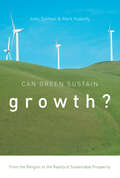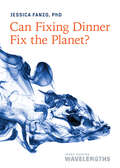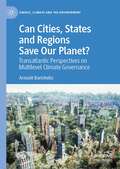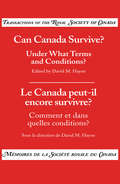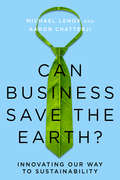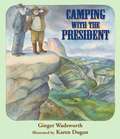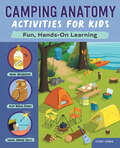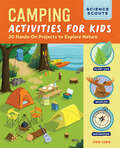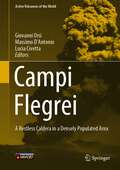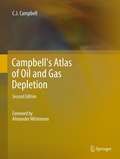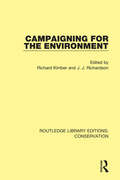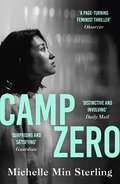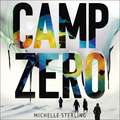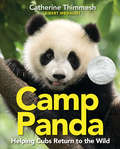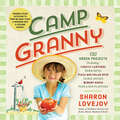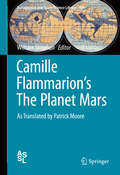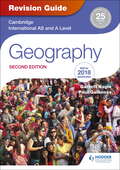- Table View
- List View
Can Green Sustain Growth?: From the Religion to the Reality of Sustainable Prosperity
by John Zysman Mark HubertyGreen growth has proven to be politically popular, but economically elusive. Can Green Sustain Growth? asks how we can move from theoretical support to implementation, and argues that this leap will require radical experimentation. But systemic change is costly, and a sweeping shift cannot be accomplished without political support, not to mention large-scale cooperation between business and government. Insightful and timely, this book brings together eight original, international case studies to consider what we can learn from the implementation of green growth strategies to date. This analysis reveals that coalitions for green experimentation emerge and survive when they link climate solutions to specific problems with near-term benefits that appeal to both environmental and industrial interests. Based on these findings, the volume delivers concrete policy recommendations for the next steps in the necessary shift towards sustainable prosperity.
Can Fixing Dinner Fix the Planet? (Johns Hopkins Wavelengths)
by Jessica FanzoHow can consumers, nations, and international organizations work together to improve food systems before our planet loses its ability to sustain itself and its people?Do we have the right to eat wrongly?As the world's agricultural, environmental, and nutritional needs intersect—and often collide—how can consumers, nations, and international organizations work together to reverse the damage by changing how we make, distribute, and purchase food? Can such changes in practice and policy reverse the trajectories of the biggest global crises impacting our world: the burden of chronic diseases, the consequences of climate change, and the systemic economic and social inequities that exist within and among nations?Can Fixing Dinner Fix the Planet? is a clarion call for both individual consumers and those who shape our planet's food and environmental policies that:• describes the often destructive path that foods take from farms and seas through their processing, distribution, marketing, purchasing and waste management sites• explores the complex web of factors impacting our ability to simultaneously meet nutritional needs, sustain biodiversity and protect the environment• raises readers' food and environmental literacy through an engaging narrative about Fanzo's research on five continents along with the work of other inspiring global experts who are providing solutions to these crises• empowers readers to contribute to immediate and long-term changes by informing their decisions in restaurants, grocery stores, farmers markets, and kitchens
Can Cities, States and Regions Save Our Planet?: Transatlantic Perspectives on Multilevel Climate Governance (Energy, Climate and the Environment)
by Arnault BarichellaThis book examines the potential for cities, states and regions to take decisive action on climate change at the local level. Local action constitutes an essential component of global efforts to keep temperatures below the 2°C Paris Agreement threshold. Focusing on three green municipal leaders - New York, Boston and Paris - this volume examines their multilevel interactions with higher governance echelons in the United States and France. Even though these countries are located on different continents, similar patterns emerge on both sides of the Atlantic. This book explores the key role of municipalities and sub-state entities in shaping the climate policy agenda vis-à-vis national governments in the US and France. It argues that inadequate articulation of multilevel governance may jeopardize efforts to limit global temperature increase below the 2°C threshold by the end of the century.
Can Canada Survive?
by David M. HayneCanada is facing a critical period in its history. The Royal Society of Canada believed it had the responsibility to instigate both deep reflection and debate within the vast and diverse intellectual network it represents throughout Canada. In November 1996, the Fellows of all three Academies of the Society gathered to discuss perspectives on Canada's future.
Can Business Save the Earth?: Innovating Our Way to Sustainability
by Aaron Chatterji Michael LenoxIncreasingly, business leaders are tasked with developing new products, services, and business models that minimize environmental impact while driving economic growth. It's a tall order—and a call that is only getting louder. In Can Business Save the Earth?, Michael Lenox and Aaron Chatterji explain just how the private sector can help. Many believe that markets will inevitably demand sustainable practices and force them to emerge. But Lenox and Chatterji see it differently. Based on more than a decade of research and work with companies, they argue that a bright green future is only possible with dramatic innovation across multiple sectors at the same time. To achieve this, a broader ecosystem of players—including inventors, executives, customers, investors, activists, and governments—all must play a role. The book outlines how and the extent to which each group can serve as a driver of green growth. Then, Lenox and Chatterji identify where economic incentives currently exist, or could exist with institutional change, and ultimately address the larger question of how far well-coordinated efforts can take us in addressing the current environmental crisis.
Camping with the President
by Ginger WadsworthShows how, while on a camping trip in 1903 with world-famous naturalist John Muir in Yosemite National Park, President Theodore Roosevelt formed his position on conservation, deciding to set aside new national parks and monuments to preserve wilderness lands for future generations.
Camping Anatomy Activities for Kids: Fun, Hands-On Learning (Anatomy Activities for Kids)
by Steve LemigExplore like a scientist with this illustrated camping guide for kids ages 8 to 12Camping is the perfect time to learn about the world around you. Adventure through nature like a real scientist with Camping Anatomy Activities for Kids. It's full of super-fun activities and lessons that show you how to build a working campsite, stay safe on the trail, and much more! You'll learn new camping skills and keep track of everything you discover as you become an outdoor lover for life.Go beyond other camping books for kids and:Experience the wilderness—20 unique lessons teach you how to ask questions about the natural world, imagine solutions to potential problems, and test ideas to prepare for a successful camping trip.Try awesome activities—Get your campsite up and running with activities like pitching a tent, reading the stars, and drawing a map.Start a camping journal—Use your own blank journal to answer writing prompts that help you record your ideas and observations.Become an expert camper as you interact with the outdoors through this nature journal for kids.
Camping Activities for Kids: 20 Hands-On Projects to Explore Nature (Science Scouts)
by Steve LemigGoing on a camping trip? Encourage kids to explore like a scientist with an illustrated camping activity guide for ages 8 to 12.Attention campers! Are you ready to think like a scientist and adventure like an explorer? This fun and interactive guide shows kids how to camp with an active mind for learning. They'll discover all the different items you need to go camping, the steps to building an awesome campsite, and how to make the most of exploring nature through 20 lessons and 20 activities to try on the trails!Explore and play—Help kids get hands-on as they make their own thermometer and solar still, find true north, learn how to safely watch nearby wildlife, and so much more.The 5 Science Scout skills—Kids will practice the key skills that scientists and explorers use to discover the world as they Observe, Ask, Imagine, Test, and Reflect.Start a camping journal—Journal pages and writing prompts will inspire kids to record their ideas and observations as they create a book of amazing camping memories!Introduce curious kids to the science of camping with Camping Activities for Kids—part of the Science Scouts series!
Campi Flegrei: A Restless Caldera in a Densely Populated Area (Active Volcanoes of the World)
by Giovanni Orsi Massimo D’Antonio Lucia CivettaThe densely populated Campi Flegrei resurgent caldera is one of the widest known, best studied and highly dangerous volcanoes of the world. This monograph synthesises the current knowledge of this volcano, through different review chapters. Each chapter of this book is dedicated to a specific volcanological aspect, authored by well-recognised experts. The volume attempts to cross the barriers between the volcanological, geological, geochemical and geophysical perspectives, and offers a comprehensive and up-to-date reference to earth-science scholars, as well as land planners and civil defence officers.
Campbell's Atlas of Oil and Gas Depletion
by Alexander Wöstmann Colin J CampbellCampbell's Atlas of Oil and Gas Depletion, Second Edition, is the product of a half-century of critical analysis and updating of data on the status of oil and gas depletion by country, region and the world as a whole. Separate analyses of conventional and non-conventional oil and gas, which are depleting at different rates and costs, show when these critical energy sources peak and decline. The Atlas also summarizes the history and political circumstances of each country to assess the impact on oil and gas production and reserves. It contrasts the First Half of the Oil Age, which saw the rapid expansion of the world economy, allowing the population to grow six-fold, with the Second Half, which will witness a general contraction as these easy, high-density energy supplies dwindle. The transition threatens to be a time of great economic, financial and political tensions. The Atlas, which has been compiled and updated by prominent geologist, former oil company executive, and oil analyst Colin Campbell since the 1960s, addresses the need for a reliable and comprehensive database on a subject essential to governments, industry, academia, and the population as a whole as we attempt to adapt to these critically changing circumstances.
Campaigning for the Environment (Routledge Library Editions: Conservation #8)
by Richard Kimber Jeremy RichardsonOriginally published in 1974 Campaigning for the Environment addresses the issue of the environmental lobby. Using seven case-studies from the time of publication, the book covers the important aspects of environmental campaigning, where the environment has been threatened and where pressure groups have been formed to defend it. The book discusses the political problems of protecting and improving the environment, and states that each campaign involves taking on major sections of the political system. Despite having been published over 40 years ago, the commentary of the book, and the analysis in the case studies is still as relevant today as it was then. This book will be of interest to academics working in the field of environment and sustainability, conservation and political studies.
Camp Zero
by Michelle Min Sterling'A cold, hungry adventure story about the power of choice and the strength of solidarity' SEAN MICHAELSAmerica, 2049: Summer temperatures are intolerably high, the fossil fuel industry has shut down, and humans are implanted with a 'Flick' at birth, which allows them to remain perpetually online. The wealthy live in the newly created Floating City off the coast, while people on the mainland struggle to get by. For Rose, a job as a hostess in the city's elite club feels like her best hope for a better future. At a Cold War-era research station, a group of highly trained women with the code name White Alice are engaged in climate surveillance. But the terms of their employment become increasingly uncertain. And in a former oil town in northern Canada called Dominion Lake, a camp is being built-Camp Zero. A rare source of fresh, clean air and cooler temperatures, it will be the beginning of a new community and a new way of life. Grant believes it will be the perfect place to atone for his family's dark legacy. Everyone has an agenda. So who can you trust? Could falling in love be most the radical act of all? Thrilling, immersive and disturbingly prescient, Camp Zero is about the world we've built and where we go from here.
Camp Zero
by Michelle Min Sterling'A cold, hungry adventure story about the power of choice and the strength of solidarity' SEAN MICHAELSThe old world is broken. Be part of a better future.America, 2049: Summer temperatures are intolerably high, the fossil fuel industry has shut down, and humans are implanted with a 'Flick' at birth, which allows them to remain perpetually online. The wealthy live in the newly created Floating City off the coast, while people on the mainland struggle to get by. For Rose, a job as a hostess in the city's elite club, feels like her best hope for a better future. At a Cold War-era research station, a group of highly-trained women with the code-name White Alice are engaged in climate surveillance. But the terms of their employment become increasingly uncertain. And in a former oil town in northern Canada called Dominion Lake, a camp is being built-Camp Zero. A rare source of fresh, clean air and cooler temperatures, it will be the beginning of a new community and a new way of life. Grant believes it will be the perfect place to atone for his family's dark legacy. Everyone has an agenda. So who can you trust? Could falling in love be most the radical act of all? Thrilling, immersive and disturbingly prescient Camp Zero is about the world we've built and where we go from here.(P)2023 Hodder & Stoughton Limited
Camp Panda: Helping Cubs Return to the Wild
by Catherine ThimmeshFrom the Sibert medal winning author of TEAM MOON and the bestselling GIRLS THINK OF EVERYTHING comes a riveting, timely account of panda conservation efforts in China, perfect for budding environmentalists and activists. <P><P>Roughly a thousand years ago, an estimated 23,000 pandas roamed wild and free through their native China. But within the past forty years, more than fifty percent of the panda’s already shrinking habitat has been destroyed by humans, leaving the beautiful and beloved giant panda vulnerable to extinction. <P><P>Despite the seemingly insurmountable odds—poaching, habitat destruction, pollution, human overpopulation, and global climate change—the panda is making a comeback. How? By humans teaching baby pandas how to be wild and stay wild.
Camp Granny: A Grandma's Bag of Tricks
by Sharon Lovejoy<P>Make leaf rubbings, blow jumbo bubbles, bake Moon Pizzas, create a firefly lantern. More than an activity book, CAMP GRANNY is an interactivity book, filled with 130 projects that connect grandparents and grandchildren through nature—in the kitchen, the garden, and the art room. <P>Illustrated with evocative photographs and the author’s watercolors, CAMP GRANNY is a book about being adventurous, about being curious, about noticing and really seeing things—about instilling a lifelong sense of wonder. <P>Please note: CAMP GRANNY was previously sold under the title Toad Cottages & Shooting Stars.
Camille Flammarion's The Planet Mars: As Translated by Patrick Moore (Astrophysics and Space Science Library #409)
by Camille Flammarionwilliam SheehanCamille Flammarion (1842-1925) began his career at 16 as a human computer under the great mathematician U. J. J. Le Verrier at the Paris Observatory. He soon tired of the drudgery; he was drawn to more romantic vistas, and at 19 wrote a book on an idea that he was to make his own--the habitability of other worlds. There followed a career as France's greatest popularizer of astronomy, with over 60 titles to his credit. An admirer granted him a chateau at Juvisy-sur-l'Orge, and he set up a first-rate observatory dedicated to the study of the planet Mars. Finally, in 1892, he published his masterpiece, La Planete Mars et ses conditions d'habitabilite, a comprehensive summary of three centuries' worth of literature on Mars, much of it based on his own personal research into rare memoirs and archives. As a history of that era, it has never been surpassed, and remains one of a handful of indispensable books on the red planet. Sir Patrick Moore (1923-2012) needs no introduction; his record of popularizing astronomy in Britain in the 20th century equaled Flammarion's in France in the 19th century. Moore pounded out hundreds of books as well as served as presenter of the BBC's TV program "Sky at Night" program for 55 years (a world record). Though Moore always insisted that the Moon was his chef-d'oeuvre, Mars came a close second, and in 1980 he produced a typescript of Flammarion's classic. Unfortunately, even he found the project too daunting for his publish ers and passed the torch of keeping the project alive to a friend, the amateur astronomer and author William Sheehan, in 1993. Widely regarded as a leading historian of the planet Mars, Sheehan has not only meticulously compared and corrected Moore's manuscript against Flammarion's original so as to produce an authoritative text, he has added an important introduction showing the book's significance in the history of Mars studies. Here results a book that remains an invaluable resource and is also a literary tour-de-force, in which the inimitable style of Flammarion has been rendered in the equally unique style of Moore.
Cambridge Studies in International and Comparative Law: Climate Change Litigation
by Hari M. Osofsky Jacqueline Peel Peel, Jacqueline and Osofsky, Hari M.This examination of the role of litigation in addressing the problem of climate change focuses not only on how the massive and growing number of lawsuits influences regulation directly, but also on how the lawsuits shape corporate behaviour and public opinion. It provides readers with an understanding of how these lawsuits have shaped approaches to mitigation and adaptation, and have been used to try to force and to block regulation. There is a particular emphasis on lawsuits in the United States and Australia, the two jurisdictions which have had the most climate change litigation in the world, and the lessons provide broader insights into the role of courts in addressing climate change.
Cambridge Studies in Early Modern British History: The Smoke of London
by William M. CavertThe Smoke of London uncovers the origins of urban air pollution, two centuries before the industrial revolution. By 1600, London was a fossil-fuelled city, its high-sulfur coal a basic necessity for the poor and a source of cheap energy for its growing manufacturing sector. The resulting smoke was found ugly and dangerous throughout the seventeenth and eighteenth centuries, leading to challenges in court, suppression by the crown, doctors' attempts to understand the nature of good air, increasing suburbanization, and changing representations of urban life in poetry and on the London stage. Neither a celebratory account of proto-environmentalism nor a declensionist narrative of degradation, The Smoke of London recovers the seriousness of pre-modern environmental concerns even as it explains their limits and failures. Ultimately, Londoners learned to live with their dirty air, an accommodation that reframes the modern process of urbanization and industrial pollution, both in Britain and beyond.
Cambridge Studies in Contentious Politics: Networks in Contention
by Jennifer HaddenHow do civil society organizations mobilize on climate change? Why do they choose certain strategies over others? What are the consequences of these choices? Networks in Contention examines how the interactions between different organizations within the international climate change movement shape strategic decisions and the kinds of outcomes organizations are able to achieve. First, it documents how and why cleavages emerged in this once-unified movement around the time of the 2009 Copenhagen Summit. Second, it shows how an organization's position in the movement's network has a large influence on the tactics it adopts. Finally, it demonstrates how the development of new strategies within this network has influenced the trajectory of global climate politics. The book establishes the ways in which networks are consequential for civil society groups, exploring how these actors can become more effective and suggesting lessons for the future coordination of activism.
Cambridge Studies in Biological and Evolutionary Anthropology: Demography and Evolutionary Ecology of Hadza Hunter-Gatherers
by Nicholas Blurton JonesThe Hadza, an ethnic group indigenous to northern Tanzania, are one of the few remaining hunter-gatherer populations. Archaeology shows 130,000 years of hunting and gathering in their land but Hadza are rapidly losing areas vital to their way of life. This book offers a unique opportunity to capture a disappearing lifestyle. Blurton Jones interweaves data from ecology, demography and evolutionary ecology to present a comprehensive analysis of the Hadza foragers. Discussion centres on expansion of the adaptationist perspective beyond topics customarily studied in human behavioural ecology, to interpret a wider range of anthropological concepts. Analysing behavioural aspects, with a specific focus on relationships and their wider impact on the population, this book reports the demographic consequences of different patterns of marriage and the availability of helpers such as husbands, children, and grandmothers. Essential for researchers and graduate students alike, this book will challenge preconceptions of human sociobiology.
Cambridge Social and Cultural Histories: Renaissance Ethnography and the Invention of the Human
by Surekha DaviesGiants, cannibals and other monsters were a regular feature of Renaissance illustrated maps, inhabiting the Americas alongside other indigenous peoples. In a new approach to views of distant peoples, Surekha Davies analyzes this archive alongside prints, costume books and geographical writing. Using sources from Iberia, France, the German lands, the Low Countries, Italy and England, Davies argues that mapmakers and viewers saw these maps as careful syntheses that enabled viewers to compare different peoples. In an age when scholars, missionaries, native peoples and colonial officials debated whether New World inhabitants could – or should – be converted or enslaved, maps were uniquely suited for assessing the impact of environment on bodies and temperaments. Through innovative interdisciplinary methods connecting the European Renaissance to the Atlantic world, Davies uses new sources and questions to explore science as a visual pursuit, revealing how debates about the relationship between humans and monstrous peoples challenged colonial expansion.
Cambridge Manuals in Archaeology: Applied Soil Micromorphology in Archaeology (Cambridge Manuals in Archaeology)
by Paul Goldberg Richard I. MacphailApplied Soils and Micromorphology in Archaeology provides the most up-to-date information on soil science and its applications in archaeology. Based on more than three decades of investigations and experiments, the volume demonstrates how description protocols and complimentary methods (SEM/EDS, microprobe, micro-FTIR, bulk soil chemistry, micro- and macrofossils) are used in interpretations. It also focuses on key topics, such as palaeosols, cultivation, and occupation surfaces, and introduces a range of current issues, such as site inundation, climate change, settlement morphology, herding, trackways, industrial processes, funerary features, and site transformation. Structured around important case studies, Applied Soils and Micromorphology in Archaeology is thoroughly-illustrated, with color plates and figures, tables and other ancillary materials on its website (www. cambridge. org/9781107011380); chapter appendices can be accessed separately using the web (www. geoarchaeology. info/asma). This new book will serve as an essential volume for all archaeological inquiry about soil.
Cambridge International Trade and Economic Law: Export Restrictions on Critical Minerals and Metals
by Ilaria EspaConventional wisdom on the insufficiency of existing WTO disciplines on export restrictions has triggered momentum on the issue. In this book, Ilaria Espa offers a comprehensive analysis of the scope and coverage of WTO disciplines on export restrictions in light of emerging case law. She investigates whether such rules still provide a sufficient, credible and effective framework capable of preventing abuses in the use of export restrictive measures on critical minerals and metals during a period of economic crisis and change in international trade patterns. Giving a broad overview of the export restrictions applied to these materials, Espa identifies distinctive features in the proliferation of export barriers and analyses the existing WTO rules to reveal their scope, gaps and inconsistencies. She goes on to present solutions based upon her findings with the aim of bringing more coherence and equity to WTO rules on the export side.
Cambridge International AS/A Level Geography Revision Guide 2nd edition
by Garrett Nagle Paul GuinnessReinforce and practice skills learned with step-by-step support from experts to help you achieve your maximum potential.- Improve your knowledge of geographical patterns, processes and changes with internationally focussed examples and case studies from around the world.- Clarify key points and ensure common mistakes are avoided with expert advice and tips.- Test and consolidate your knowledge with end of topic questions and answers, and exam-style questions for AS and A2 levels.- Plan and pace your revision with the revision planner.
Cambridge International AS/A Level Geography Revision Guide 2nd edition
by Garrett Nagle Paul GuinnessExam board: Cambridge Assessment International EducationLevel: A-levelSubject: GeographyFirst teaching: September 2016First exams: Summer 2018 Reinforce and practise skills learned with step-by-step support from experts to help you achieve your maximum potential.- Improve your knowledge of geographical patterns, processes and changes with internationally focussed examples and case studies from around the world.- Clarify key points and ensure common mistakes are avoided with expert advice and tips.- Test and consolidate your knowledge with end of topic questions and answers, and exam-style questions for AS and A2 levels.- Plan and pace your revision with the revision planner.
